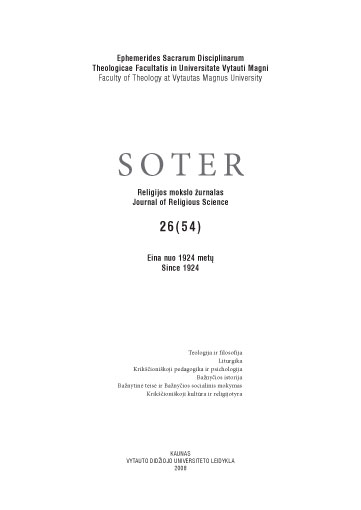Lenkiškosios etninės muzikinės kultūros sklaida Lietuvoje XVI–XX amžiuj
INFLUENCE OF POLISH ETHNIC MUSICAL CULTURE IN LITHUANIA IN 16TH–2OTH CC.
Author(s): Romualdas Apnavičius, Alfonsas MotuzasSubject(s): Christian Theology and Religion
Published by: Vytauto Didžiojo Universitetas
Keywords: Lietuva; Lenkija; kultūra; etninė muzika (religinė); Lithuania; Poland; culture; the ethnical music (religious).
Summary/Abstract: The influence of Polish ethnic musical culture in Lithuania is evident mainly in usage of European musical instruments and of folk dances repertoire as well in the religious ethnic music. European musical instruments were spread in Lithuania at the beginning of 16th–17th cc. These instruments were adopted by Lithuanians from Poland or from Western Byelorussia, where the Catholic Church and strong traditions of Polish culture were prevailing. European folk dances were performed by the Lithuanians at the beginning of 18th–19th cc., and the main part of these dances was spread to Lithuania from Poland. Noticeable part of folk dances repertoire consists of Polish dances. These new dances were lead by the music of the European instruments; it was the noticeable innovation, because until this period, Lithuanian games and round games, as well as in all the other nations of Europe, were performed by singing. We can notice less Polish influence in Lithuanian ethnic songs, while researching monody of Lithuanians and Poles is evident, that songs of this style of ethnic music of both nations were spread from Great Poland to Southern and Middle Lithuania, most probably, marking the common area of former culture of ethnic music. The roots of this former culture could reach the prehistorical times. Polish influence is evident in the traditions of so called “literary” songs, which were popular in 19th – beginning of 20th cc., and in the repertoire of latest centuries of ethnic musical instruments. The ethnic music from Poland of the Additional service in Lithuania: devotions and songs of Advent Little hours of St. Mary the Virgin, devotions and songs of Mournful Whining and devotion and songs of the Žemaičių Kalvarija (Samogitia in Latin) – are the reflection of the Polish origin. In Poland and Lithuania from time immemorial on Advent Sundays, as early as before the sunrise, early Mass (Matins) has been held which begins with the words Rorate coeli and therefore it is called Rarotos (in Lithuania). Its origin in Lithuania is linked to Poland. Their basis was The Little hours of St. Mary the Virgin or Godzinki (in Poland). This cult has come to Lithuania from Cracow in the 17th century. The customs of Mournful Whining or Gorzkie Żale (in Poland) prayers and songs is known only in Lithuania and Poland. The liturgy of Rome does not have this customs. The earliest manuscript text of Gorzkie Żale was founded in Poland (Calvaria Zebrzydowska, Warsaw) in 17th century. Having this religious practice originated in Poland, finally is spread in Lithuania as late as mid-19th century. The devotions and songs of the Žemaičių Kalvarija (Samogitia) are established by the model of Polish Calvaria Zebrzydowska. The cult of Žemaičių Kalvarija was born in 1637. Its religious ethnic music is the analogue of Polish religious culture. Roots of the Polish influence arose not only because of the neighbourhood of the both nations, but also because of living in the common state an
Journal: SOTER: religijos mokslo žurnalas
- Issue Year: 54/2008
- Issue No: 26
- Page Range: 163-181
- Page Count: 19
- Language: Lithuanian

